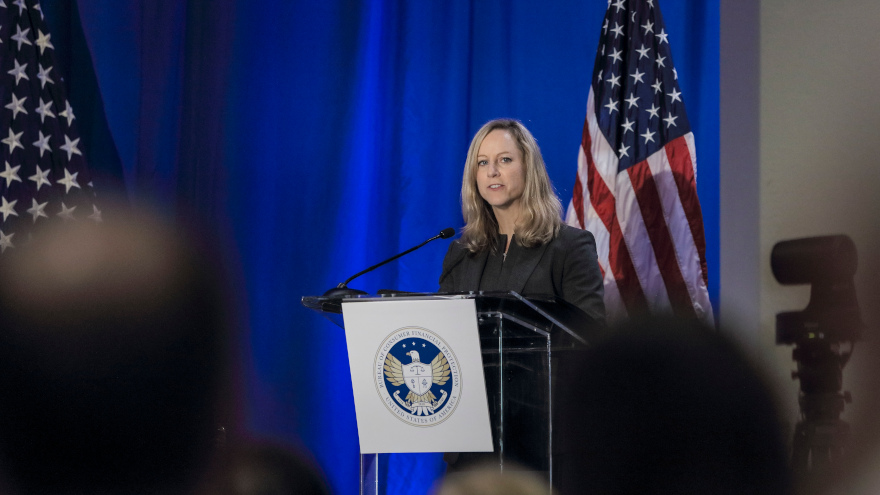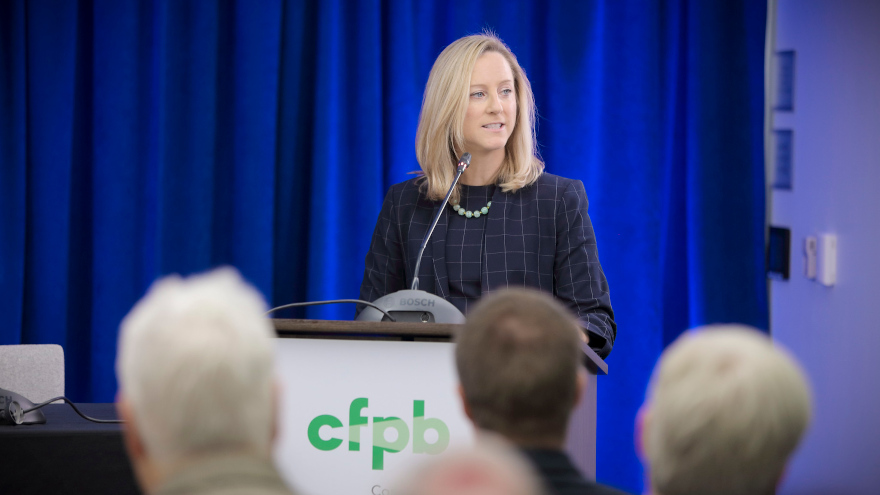This week, the Consumer Financial Protection Bureau enhanced its consumer complaint database with the addition of a geospatial view.
The CFPB explained consumers now will be able to view complaints by state with a U.S. map visualization.
Previously, the regulator indicated consumers have been able to view complaints by using date, company name, key words and other filters. The bureau also has added new options, including the ability to:
— Select from set of pre-defined time frames (such as three years) to help users understand more recent marketplace conditions.
— Map complaints per 1,000 population or total complaints by state.
—View aggregate information about products and issues consumers submit complaints about.
— Apply word searches and filters to update the interactive map.
“The consumer complaint database is a powerful tool for the Bureau to hear directly from consumers about their concerns and experiences with financial products and services,” CFPB director Kathleen Kraninger said in a news release.
“The interactive map and other enhancements are part of our effort to provide the public with additional information and context regarding consumer complaints that are received.”
The interactive map features, as well as other enhancements, were first announced by the bureau in September. Those enhancements included integration of financial information and resources into the complaint process to help address questions and better inform consumers before they submit a complaint, as well as modification of disclaimers to provide better context to the published data.
Since 2011, the CFPB said it has handled more than 2.2 million consumer complaints. Officials pointed out more than 5,000 financial companies have responded through this process, providing timely responses to 97% of the more than 1.5 million complaints sent to them for response.
According to the bureau, complaints are published after the company responds, confirming a commercial relationship with the consumer, or after 15 days, whichever comes first.
The consumer complaint database is available at www.consumerfinance.gov/data-research/consumer-complaints.
The Consumer Financial Protection Bureau explained how it potentially could be quite monetarily worthwhile for someone to be a whistleblower.
In fact, it could be as much as $10 million worthwhile in funds from the company found guilty of infractions as it relates to fair-lending violations.
As a part of a three-part initiative connected to a “one of its key priorities,” the CFPB explained in its Whistleblower Award Incentive Legislative Proposal that one or more whistleblowers who voluntarily provided original information that leads to the successful enforcement of the covered administrative proceeding or court action in an aggregate amount equal to:
— Not less than 10%, in total, of what has been collected of the monetary sanctions imposed in the action
— Not more than 30%, in total, of what has been collected of the monetary sanctions imposed in the action
The maximum award to any single whistleblower is limited to $10 million.
In the event the bureau is unable to collect at least $1 million of the monetary sanctions imposed in the action, the CFPB said it would provide for an award to any single whistleblower equal to 10% of the amount collected or $50,000, whichever is greater.
The CFPB emphasized that it’s looking to prevent consumer harm through a three-prong strategy, including:
— Implementing an advisory opinion program to provide clear guidance to assist companies in better understanding their legal and regulatory obligations through advisory opinions;
— Amending and reissuing its responsible business conduct bulletin, which articulates that the bureau intends to provide credit to entities for their responsible conduct based on its extent and significance
— Engaging with Congress to advance proposed legislation that would authorize the bureau to award whistleblowers who report violations of Federal consumer financial law.
The bureau said it submitted the proposed legislative language to U.S. House Speaker Nancy Pelosi and U.S. Senate President Michael Pence, as well as the chairs and ranking members of the authorizing committees in both chambers. It would amend Title X of the Dodd-Frank Act and provide the authority to establish a whistleblower award program.
Officials explained that potentially multi-million incentive created for employees to report wrongdoing to the bureau will assist in advancing enforcement cases, especially as it relates to fair lending violations. Under the proposed legislation, in cases where a whistleblower provides voluntary information that leads to successful enforcement action, the bureau will be able to pay an award based on a percentage of the monetary sanctions collected in the action.
“These steps reinforce the Bureau’s commitment to preventing consumer harm. Advisory opinions will ensure that companies know what compliance entails and what constitutes a violation. We also want to incentivize whistleblowers to contact us if they believe their employer is not complying with the law,” CFPB director Kathleen Kraninger said in a news release.
Under the advisory opinion program, parties will submit requests for an advisory opinion to the bureau via its website. The CFPB said will issue additional procedures for how requests will be addressed, including how the bureau will prioritize requests.
To increase transparency and to provide regulatory certainty to all regulated entities and other stakeholders, the bureau indicated that it will publish the responding advisory opinion in the Federal Register and on its website. The opinion will include an interpretation of the bureau’s existing rules.
Under a current guidance process, responses to individual regulatory inquiries are generally available to the individual requestor. Officials said that process will remain available alongside the advisory opinion program, as will the Bureau’s other efforts to provide clear guidance to the public.
The bureau recapped that it originally published a responsible business conduct bulletin in June 2013. This bulletin is designed to update and strengthen the original bulletin and is intended to clarify the bureau’s approach to responsible business conduct and emphasize the importance of such conduct.
Officials explained responsible conduct can improve the bureau’s ability to:
— Promptly detect violations
— Increase the effectiveness of its supervisory and enforcement work
— Enable the bureau to better focus its finite resources
— Help more consumers get redress
The bulletin identifies four categories of responsible conduct: self-assessing, self-reporting, remediation, and cooperation.
If an entity meaningfully engages in these activities, the bureau said it will favorably consider it, along with other relevant factors, in addressing violations of federal consumer financial law in supervisory and enforcement matters.
“Responsible conduct is in the public interest. Entities that build a culture of compliance and engage in responsible conduct support consumer protection and the Bureau’s efforts to both prevent harm to consumers and enforce the law against bad actors,” Kraninger said.
The proposed legislative language is available here.
The Responsible Business Conduct Bulletin is available here.
Last week, the Consumer Financial Protection Bureau shared their latest action involving collections and time-barred debt disclosures.
The bureau issued a supplemental notice of proposed rulemaking (supplemental NPRM) regarding the collection of time-barred debt. The bureau proposes to prohibit collectors from using non-litigation means such as calls to collect on time-barred debt unless collectors disclose to consumers during the initial contact and on any required validation notice that the debt is time-barred.
Consumer research conducted by the bureau found that a time-barred debt disclosure “helps consumers understand that they cannot be sued if they do not pay.”
Officials added, “That can help consumers make better-informed decisions whether to pay the debt or not.”
Last May, the bureau published a proposal to implement the Fair Debt Collection Practices Act (FDCPA). The May proposal would provide consumers with what the regulator called “clear protections against harassment by debt collectors and straightforward options to address or dispute debts.” The CFPB went on to explain its proposal also would:
— Set “clear, bright-line” limits on the number of calls debt collectors may place to reach consumers on a weekly basis
— Clarify how collectors may communicate lawfully using newer technologies, such as voicemails, emails and text messages, that have developed since the FDCPA’s passage in 1977
— Require collectors to provide additional information to consumers to help them identify debts and respond to collection attempts
The bureau also mentioned its proposal from last May suggested to prohibit debt collectors from “suing or threatening to sue on debts they know or should know are time-barred.” The bureau said it included the “know or should know” standard in its proposal recognizing the concern that, in some instances, debt collectors may be genuinely uncertain whether the statute of limitations has expired even after undertaking a reasonable investigation.
The bureau said it received more than 14,000 public comments on the May proposal. A large number of comments addressed time-barred debt, including the proposed “know or should know” standard.
The CFPB acknowledged that the regulator is analyzing those comments as part of the process of taking final action on the May proposal.
Officials added that its latest supplemental NPRM proposes model language and forms that debt collectors could use to comply with the proposed disclosure requirements.
“As with the May (proposal), the supplemental NPRM also proposes to require disclosures only if a debt collector knows or should know that the debt is time-barred to address debt collector liability if there was too much uncertainty as to whether a debt was time-barred,” officials said.
“The public is invited to submit written comments on the proposed rule, including on the proposed knowledge standard,” they continued. “The bureau will carefully consider all comments received before a final regulation is issued.
The supplemental NPRM is available here.
Finance companies and other service providers involved with auto financing now have a bit more clarity about what the Consumer Financial Protection Bureau constitutes as abusive practices.
Last week, the bureau issued a policy statement providing what the regulator called a “common-sense framework” on how it intends to apply the “abusiveness” standard in supervision and enforcement matters.
Officials reiterated the Dodd-Frank Act is the first federal law to broadly prohibit “abusive” acts or practices in connection with the provision of consumer financial products or services. However, nearly a decade after the act became law, the CFPB acknowledged that uncertainty remains as to the scope and meaning of abusiveness.
“This uncertainty creates challenges for covered persons in complying with the law and may impede or deter the provision of otherwise lawful financial products or services that could be beneficial to consumers,” the bureau said in a news release.
Through this policy statement, the bureau explained that it is providing clarification on how it intends to apply abusiveness in order to promote compliance and certainty. Starting immediately the bureau intends to apply the following principles during supervision and enforcement work by:
— Focusing on citing or challenging conduct as abusive in supervision and enforcement matters only when the harm to consumers outweighs the benefit
— Generally avoiding “dual pleading” of abusiveness and unfairness or deception violations arising from all or nearly all the same facts, and alleging “stand alone” abusiveness violations that demonstrate clearly the nexus between cited facts and the Bureau’s legal analysis
— Seeking monetary relief for abusiveness only when there has been a lack of a good-faith effort to comply with the law, except the Bureau will continue to seek restitution for injured consumers regardless of whether a company acted in good faith or bad faith
“I am committed to ensuring we have clear rules of the road and fostering a culture of compliance – a key element in preventing consumer harm,” CFPB director Kathleen Kraninger said.
“We’ve developed a policy that provides a solid framework to prevent consumer harm while promoting the clarity needed to foster consumer beneficial products as well as compliance in the marketplace, now and in the future,” she continued
In the policy statement that’s available here, the bureau pointed out that it left open the possibility of engaging in future rulemaking to further define the abusiveness standard.
Consumer Bankers Association president and chief executive officer Richard Hunt welcomed the CFPB’s latest actions involving “abusiveness” standard in supervision and enforcement matters.
“Defining the CFPB’s interpretation of its UDAAP authority will assist consumers as well as financial institutions working to meet their customers’ needs by offering safe and sound banking products within a well-regulated industry,” Hunt said in a statement. “We applaud the bureau for issuing this statement that provides regulatory clarity.”
Last year, the bureau held a symposium on abusive acts or practices with academics and practitioners. These experts provided a variety of perspectives on the need and benefits in developing a clearer understanding of the abusiveness standard and most agreed that the bureau should seek to resolve the uncertainty.
Officials noted that the symposium, along with other feedback from stakeholders, was an important part of the process leading to the bureau’s decision to issue the policy statement.
The symposium archived webcast can be found here.
Two dozen state attorneys general are joining their legal horsepower together to support their federal regulatory colleagues in what they believe is a threat against consumer protections provided by the Dodd-Frank Act.
This week, New York Attorney General Letitia James led a coalition of 24 attorneys general fighting to ensure that the states can continue to benefit from what they called the “powerful” tools under Title X of the Dodd-Frank Act that help them protect consumers from what they say are fraud and abusive consumers practices.
In an amicus brief filed in Seila Law versus the Consumer Financial Protection Bureau, James and the coalition argue that the U.S. Supreme Court should preserve the CFPB and other significant consumer protections provided by Title X.
“Following the Great Recession, the Consumer Financial Protection Bureau was created as an independent enforcer of consumer protection laws to ensure that consumers could never again be so egregiously defrauded, deceived, or misled by private companies,” James said in a news release.
“Opponents are now asking the Supreme Court to undo years of financial and consumer protections that have saved Americans hundreds of millions of dollars and remedied countless abusive and fraudulent practices,” she continued. “Our coalition will continue fighting to ensure the existence of the CFPB and, more importantly, the continuation of the protections that help the states ensure the financial protection of the American people.”
In 2017, the AGs recapped that the CFPB started an investigation into the California law firm Seila Law for its debt-relief practices. Seila Law sought to block the investigation entirely, arguing that the CFPB is unconstitutionally structured because the agency's director may only be terminated by the president “for inefficiency, neglect of duty, or malfeasance in office.”
According to Seila Law, this for-cause removal provision impinges on the executive power and violates the Constitution’s separation of powers clause. The U.S. District Court for the Central District of California and U.S. Court of Appeals for the Ninth Circuit both rejected Seila Law’s arguments and upheld the constitutionality of the CFPB.
Seilia Law has now appealed to the U.S. Supreme Court, again arguing that the CFPB is unconstitutional and that the entirety of Title X of the Dodd-Frank Act — which includes the provisions that created the CFPB, as well as powerful new tools for state consumer protection enforcement — must be struck down.
In the 43-page amicus brief available here, James and the coalition argue that the CFPB’s structure is constitutional and that — even if the for-cause removal provision is invalid — the CFPB and the rest of Title X should survive.
The brief highlighted the many ways that the states have worked cooperatively with the CFPB to root out fraud and abusive consumer practices in the market, including joint enforcement actions and information sharing. The brief also noted the various provisions of Title X that are unrelated to the CFPB, but nonetheless give the states powerful tools to combat fraud and abusive practices.
As stated in the brief, the AGs contend these provisions provide important support to the states’ efforts to protect consumers and are independent of the CFPB. The brief concludes by arguing that these new state powers should survive even if the for-cause removal provision or the CFPB itself is unconstitutional.
Joining James in filing the amicus brief are the attorneys general of:
—California
—Colorado
—Connecticut
—Delaware
—Hawaii
—Illinois
—Maine
—Maryland
—Massachusetts
—Michigan
—Minnesota
—Nevada
—New Jersey
—New Mexico
—North Carolina
—Oregon
—Pennsylvania
—Rhode Island
—Vermont
—Virginia
—Washington
—Wisconsin
—District of Columbia
This week, the Consumer Financial Bureau began to accept applications for membership on all four of its advisory committees — the Consumer Advisory Board, the Community Bank Advisory Council, the Credit Union Advisory Council and the Academic Research Council.
The bureau also shared seven examples of the types of applicants the regulator is seeking, including:
— Experts in consumer protection, community development, consumer finance, fair lending, and civil rights
— Experts in consumer financial products or services, including consumer reporting, student lending, small dollar lending, credit cards, debt collection, and debt relief
— Experts in consumer finance education
— Representatives of banks and credit unions that serve underserved communities
— Representatives of communities that have been significantly impacted by higher priced mortgage loans
— Current employees of credit unions and community banks
— Academics (experienced economists with a strong research and publishing or practitioner background, and a record of involvement in research and public policy, including public or academic service)
“These advisory committees provide the bureau with information about emerging trends and practices in the consumer financial marketplace,” the bureau said in a blog post announcing the path to apply. “They also allow us to hear directly from small financial institutions.
The deadline to submit an application is Feb. 27. Individuals can apply by going to this website.
The American Financial Services Association applauded one of the first actions of 2020 made by the Consumer Financial Protection Bureau (CFPB). A Hudson Cook partner is among the four members who will serve on the bureau’s taskforce on federal consumer financial law.
According to a news release distributed by the CFPB this week, the taskforce on federal consumer financial law will examine the existing legal and regulatory environment facing consumers and financial services providers and report to director Kathleen Kraninger its recommendations for ways to improve and strengthen consumer financial laws and regulations.
The bureau indicated the taskforce will produce new research and legal analysis of consumer financial laws in the United States, focusing specifically on:
— Harmonizing, modernizing and updating the federal consumer financial laws and their implementing regulations
— Identifying gaps in knowledge that should be addressed through research
— Ways to improve consumer understanding of markets and products
— Potential conflicts or inconsistencies in existing regulations and guidance
The taskforce members are:
— Howard Beales III, former professor of strategic management and public policy at George Washington University and former director of the bureau of consumer protection at the Federal Trade Commission
— Thomas Durkin, who retired as senior economist at the Federal Reserve Board
— Jean Noonan, current partner at Hudson Cook and former general counsel at the Farm Credit Administration and former associate director of the bureau of consumer protection’s credit practice at the Federal Trade Commission
— Todd Zywicki, professor of law at George Mason University Antonin Scalia Law School, senior fellow of the Cato Institute, and former executive director of the GMU Law and Economics Center
The bureau also announced the designation of Zywicki to serve as the chair of the taskforce and the appointment of Matt Cameron to serve as staff director of the taskforce.
“The taskforce will conduct a thorough examination of our current regulatory framework and report on how we can improve federal consumer financial laws to benefit and protect consumers,” Kraninger said. “I look forward to the work the taskforce will undertake and reviewing their recommendations.”
The formation of this group arrived as a welcomed development, according to Bill Himpler, president and chief executive officer of the American Financial Services Association (AFSA).
“AFSA and its members are pleased that the bureau is taking a data-driven, research-based approach to its rule making and supervision,” Himpler said in a statement to SubPrime Auto Finance News. “The last serious and expansive effort to understand the consumer credit marketplace and how consumers access and use credit products was a Congressionally mandated commission on credit more than 50 years ago.
“The consumer credit industry is responsible for more than $1 trillion annually added to our economy, and our hope is that this taskforce will help shape pro-consumer policies that both protect and provide consumers with greater access to the credit products and services they need,” Himpler continued.
“We congratulate those who have committed to this public service, and we look forward to working with the taskforce in the months ahead,” he went on to say.
This week, Consumer Financial Protection Bureau director Kathleen Kraninger celebrated her one-year anniversary leading the regulator.
Kraninger highlighted through a news release that during her first year she met with more than 800 consumers, consumer groups, state and local government officials, military personnel, financial institutions, academics, non-profits and former and current bureau advisers and traveled to 17 states.
“It is an honor and privilege to serve and protect American consumers,” Kraninger said in the news release. “In this last year, we’ve greatly enhanced consumer protection by harnessing the resources provided by Congress to be more effective and comprehensively utilized.
“I commend the bureau employees who work tirelessly to achieve our mission,” she continued. “We will continue to use all of our tools to not only go after bad actors that break the law, but also to prevent harm in the first place by building a culture of compliance throughout the financial system. This culture of compliance can only be built by having smart and clear rules of the road as well as a robust supervisory examination process. I look forward to our continued work in the next four years on behalf of American consumers.”
Kraninger also marked her anniversary by making a public appearance and sharing remarks during the National Association of Attorneys General Capital Forum. She not only reiterated her attempts to reach out to various segments of financial services, but she also revisited a development that surfaced back in September.
The bureau, working in partnership with multiple state regulators, previously launched the American Consumer Financial Innovation Network (ACFIN). It’s an organization that officials explained is designed to enhance coordination among federal and state regulators to facilitate financial innovation.
The CFPB said it invited all state regulators to join ACFIN, and the initial members of ACFIN are the attorneys general of:
— Alabama
— Arizona
— Georgia
— Indiana
— South Carolina
— Tennessee
— Utah
“ACFIN allows federal and state officials to coordinate efforts to facilitate innovation and further shared objectives such as consumer protection and access, competition and financial inclusion, and it also provides a platform for our federal and state partners to coordinate as they develop new rules of the road and apply existing ones,” Kraninger said this week.
“This coordination also promotes regulatory certainty for innovators, which will benefit consumers and the economy alike. The network also seeks to keep pace with market innovations and help ensure they are free from fraud, discrimination and deceptive practices,” she went on to say.
Kraninger also used her speech to the attorneys general to touch on a topic probably most important to dealerships and finance companies.
“One of the bureau’s critical tools is rulemaking and guidance where appropriate — articulating clear rules of the road for regulated entities that promote competition, increase transparency and preserve fair markets for financial products and services,” she said. “Where Congress directs the CFPB to promulgate rules or address specific issues through rulemaking, we will comply with the law.
“Where the bureau has discretion, we will focus on preventing consumer harm by maximizing informed consumer choice and prohibiting acts or practices which undermine the ability of consumers to choose the products and services that are best for them,” Kraninger continued.
“To develop the best possible rules, the CFPB must use the best possible process. Because rules are general standards, they are not best articulated on a case-by-case basis through enforcement actions,” she went on to say.
“Rather, they should be developed through a rulemaking process that is transparent; that allows stakeholders to submit comments; that allows partners to weigh in; that reflects rigorous economic and market analysis; and that provides for judicial review. Under my leadership, the CFPB will proceed deliberately and transparently in its rulemakings,” Kraninger added.
The Federal Trade Commission (FTC) and the Consumer Financial Protection Bureau (CFPB) will host a public workshop on Tuesday to discuss issues affecting the accuracy of both traditional credit reports and employment and tenant background screening reports.
The regulators shared 11 different questions they might be tackling in light of marketplace changes during the past five years.
Since the FTC released its 2012 study on accuracy in credit reporting, officials acknowledged there have been several changes in the landscape that impact the accuracy of consumer reports. In 2012, the CFPB began conducting supervisory reviews over large credit reporting agencies (CRAs), as well as various providers of consumer financial products or services that furnish information about consumers to CRAs.
In addition, in 2015, following state investigations regarding various credit reporting issues, officials recollected that the nationwide CRAs agreed to a multi-state settlement that requires stricter standards for matching records, removal of certain public record information, and restrictions on medical debt reporting. Also, new developments, such as the use of machine learning and alternative data in making eligibility determinations, present both opportunities and challenges for the consumer reporting industry.
The CFPB and the FTC said their workshop seeks to bring together stakeholders — including industry representatives, consumer advocates and regulators — for a wide-ranging public discussion on the many issues impacting the accuracy of consumer reports.
Potential topics for discussion include:
— What are the lessons from the CFPB’s supervisory reviews of CRAs and furnishers on accuracy and dispute obligations?
— What are the lessons from CFPB and FTC enforcement cases on furnisher and CRA accuracy obligations?
— How do furnishing practices differ based on the types of furnishers and the information they furnish to CRAs, and how does that impact accuracy?
— What has been the effect of the removal of most civil judgments and tax liens from credit reports and recent changes in the reporting of medical debt?
— How do background screening CRAs address accuracy in light of the limited personal identifying information included in public records?
— What opportunities or challenges does inclusion of non-traditional data in credit reports, credit scoring models, or background screening reports present for accuracy?
— Can new technologies and data management practices be used to improve accuracy?
— How do consumers learn about inaccuracies on their consumer reports and navigate the current dispute process? What are the experiences of victims of identity theft in the dispute process?
— How have the changes to the dispute process contained in the National Consumer Assistance Plan, which evolved out of the 2015 multi-state settlement, impacted the consumer experience?
— Once consumers get erroneous information removed from their credit files through the dispute process, do they still have difficulties getting loans or other credit?
— What government measures (including changes in the law) and private sector measures could improve accuracy? What are the costs and benefits of these possible measures?
The workshop, which is free and open to the public, will be at the Constitution Center, 400 7th St., SW in Washington, D.C., and will be webcast live on the FTC’s website.
Hudson Cook is preparing to offer the industry another way to stay up to date on the Consumer Financial Protection Bureau’s activities.
Hudson Cook partners Eric Johnson and Justin Hosie will be hosts for a new monthly webinar series titled, “CFPB Bites of the Month.” Johnson and Hose are scheduled to orchestrate their first webinar on Jan. 15.
“With consumer financial services concerns front and center in the daily news cycles — including the 2020 presidential election — the Consumer Financial Protection Bureau’s work has taken center stage,” Hudson Cook said.
“Since Trump’s appointee, Kathleen Kraninger, took over as the bureau’s director in December 2018, we’ve seen an increase in the number of CIDs issued and enforcement actions over prior acting director Mick Mulvaney, and continued examinations, as well as an emphasis on consumer financial education,” the firm continued.
To help keep clients abreast of what is happening at the CFPB, the firm noted these monthly updates, including but not limited to: CFPB press, rulemaking, ongoing litigation, supervision and other timely news.
In order to accommodate busy schedules, the webinars will last just 30 minutes during lunchtime on the third Wednesday of each month.
“With all of the press reports about the CFPB flooding our inboxes every day, we felt it would help our clients to take just 30 minutes a month to keep them up-to-date on the CFPB and how its work may affect their businesses,” Hosie said in a news release.
Johnson added, “We write plenty of articles for various industry publications but thought it would benefit busy in-house counsel and other company executives if we condensed everything into a regular report. We want our clients to know what’s going on and how to mitigate their risk.”
Hudson Cook’s attorneys include former senior federal regulators and staff attorneys, including for the CFPB, as well as former in-house counsel for major banks and finance companies. Working with the firm’s government investigations, examinations and enforcement practice group, attorneys closely watch developments among federal and state agencies and legislative bodies to anticipate new laws and regulations as well as changes to existing statutes.
“CFPB Bites of the Month” is the newest webinar series from Hudson Cook, joining the monthly series titled, “Compliance Coffee Breaks” on the second Tuesday of each month.
Information about all of the firm’s webinars can be found at hudsoncook.com/webinars.












